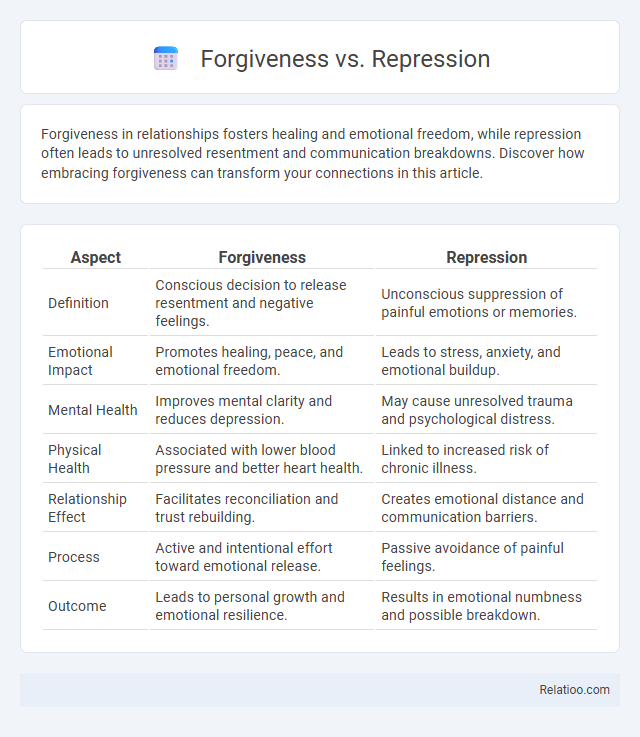Forgiveness in relationships fosters healing and emotional freedom, while repression often leads to unresolved resentment and communication breakdowns. Discover how embracing forgiveness can transform your connections in this article.
Table of Comparison
| Aspect | Forgiveness | Repression |
|---|---|---|
| Definition | Conscious decision to release resentment and negative feelings. | Unconscious suppression of painful emotions or memories. |
| Emotional Impact | Promotes healing, peace, and emotional freedom. | Leads to stress, anxiety, and emotional buildup. |
| Mental Health | Improves mental clarity and reduces depression. | May cause unresolved trauma and psychological distress. |
| Physical Health | Associated with lower blood pressure and better heart health. | Linked to increased risk of chronic illness. |
| Relationship Effect | Facilitates reconciliation and trust rebuilding. | Creates emotional distance and communication barriers. |
| Process | Active and intentional effort toward emotional release. | Passive avoidance of painful feelings. |
| Outcome | Leads to personal growth and emotional resilience. | Results in emotional numbness and possible breakdown. |
Understanding Forgiveness: A Psychological Perspective
Forgiveness involves consciously choosing to release feelings of resentment or anger toward someone who has caused harm, promoting emotional healing and psychological well-being. Unlike repression, which unconsciously pushes painful memories out of awareness, and denial, which refuses to acknowledge reality, forgiveness requires active cognitive processing and empathy. Psychological studies reveal that forgiveness reduces stress, lowers depression, and improves interpersonal relationships by fostering emotional resilience.
What is Repression? Unpacking the Concept
Repression is a psychological defense mechanism where uncomfortable thoughts, feelings, or memories are unconsciously pushed out of conscious awareness to protect the individual from emotional distress. Unlike denial, which involves refusing to acknowledge reality, repression hides these inner conflicts deep within the subconscious, often influencing behavior without your explicit awareness. Understanding repression can help you identify and address hidden emotional wounds that impact mental well-being.
The Emotional Impact of Forgiveness
Forgiveness releases Your emotional burdens by allowing healing and reducing stress, unlike repression and denial which intensify unresolved feelings and prolong psychological pain. The emotional impact of forgiveness promotes inner peace, improves mental health, and fosters healthier relationships. Choosing forgiveness helps break the cycle of negative emotions, enabling emotional growth and resilience.
The Hidden Costs of Repression
Repression buries painful emotions deep within your subconscious, creating hidden psychological stress that can manifest as anxiety, depression, or physical ailments over time. Unlike forgiveness, which promotes healing and emotional release, repression leads to unresolved trauma and increased mental strain. Addressing your feelings openly prevents the costly consequences of denial and repression on your overall well-being.
Forgiveness vs Repression: Key Differences
Forgiveness involves consciously acknowledging hurt and releasing negative emotions, promoting emotional healing and psychological well-being. Repression, by contrast, unconsciously pushes painful memories or feelings out of awareness, often leading to unresolved internal conflict and stress. Understanding these distinctions helps you address emotional pain effectively, fostering healthier coping mechanisms.
How Repression Affects Mental Health
Repression involves unconsciously blocking distressing thoughts or memories, which can intensify anxiety, depression, and emotional instability. This mental mechanism prevents You from addressing core issues, leading to unresolved conflicts and increased psychological stress. Chronic repression often disrupts cognitive processes, impairing emotional regulation and overall mental well-being.
The Benefits of Practicing Forgiveness
Practicing forgiveness fosters emotional healing by releasing resentment and reducing stress, which enhances mental well-being. It promotes healthier relationships by encouraging empathy and understanding, enabling you to move forward without the burden of past grievances. Choosing forgiveness over repression or denial empowers your personal growth and cultivates resilience in facing life's challenges.
Recognizing Signs of Emotional Repression
Recognizing signs of emotional repression involves identifying persistent feelings of numbness, unexplained physical ailments, and chronic anxiety without clear triggers. Individuals often suppress painful memories or emotions, leading to avoidant behaviors and difficulties forming authentic connections. Understanding these indicators is crucial for distinguishing repression from denial, which typically involves outright refusal to acknowledge reality, and forgiveness, which requires conscious acceptance and emotional healing.
Steps Toward Genuine Forgiveness
Genuine forgiveness involves recognizing and accepting the pain caused by a hurtful event without minimizing or denying it, distinguishing it clearly from repression and denial where emotions are either suppressed or ignored. The critical steps toward authentic forgiveness include acknowledging the offense, expressing emotions constructively, and consciously deciding to release resentment to promote emotional healing. Research in psychology highlights that genuine forgiveness correlates with improved mental health, reduced stress levels, and stronger interpersonal relationships.
Choosing Forgiveness Over Repression for Personal Growth
Choosing forgiveness over repression fosters emotional healing by allowing you to confront and release negative feelings instead of burying them deep within. Forgiveness cultivates resilience, reduces stress, and promotes mental clarity, whereas repression often leads to unresolved trauma and psychological distress. Prioritizing forgiveness empowers your personal growth by transforming pain into understanding and strength.

Infographic: Forgiveness vs Repression
 relatioo.com
relatioo.com